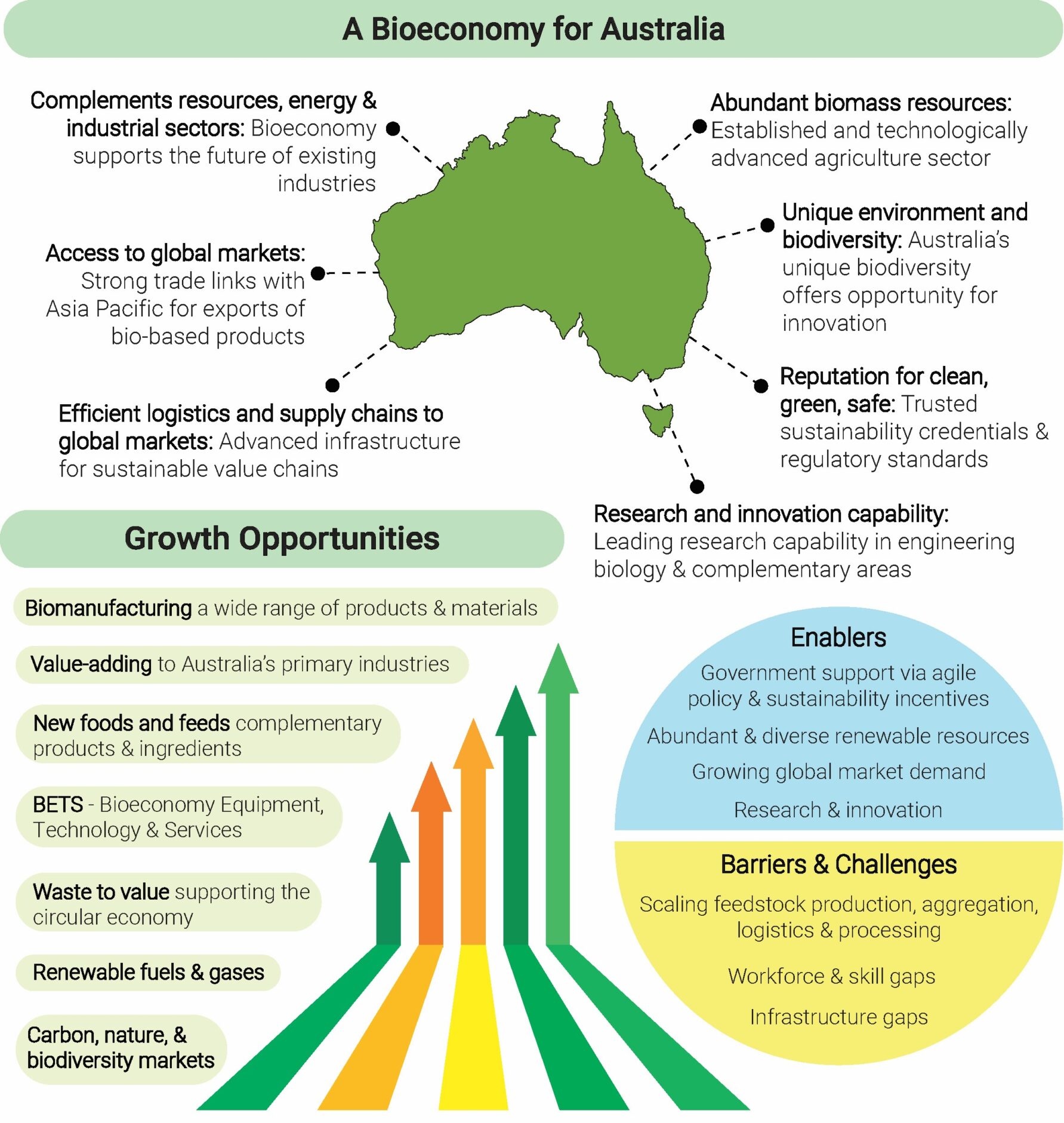
Australia must develop a national bioeconomy strategy and invest in new infrastructure to unlock key economic growth opportunities, scientists say in a new report.
Home to some of the world’s leading food tech companies, Australia has a significant opportunity to become a global bioeconomy leader and boost its economic growth, but only if the government invests in the industry.
In a new report by the Queensland University of Technology (QUT) and the ARC Centre of Excellence in Synthetic Biology, scientists are calling upon the government to urgently create a national bioeconomy plan to “risk losing the ability to compete” with other nations.
Most of the G20 economies already have such national strategies, thanks to the Bioeconomy Initiative, which creates a global framework to support this industry. This has provided governments with a focal point for coordinated action to unlock private investment.
“It is a pivotal moment of economic transformation for Australia, which is driven by the shifting global market, rapid technological advancements and the move towards a low-carbon economy,” said Professor Ian O’Hara, deputy dean at QUT’s Faculty of Engineering, and co-author of the report.
“Without a unified effort and strategic approach by government, industry and researcher partners, Australia risks losing the opportunity to compete effectively in this market,” he added.
Australia already has the ingredients to be a leader

The bioeconomy entails using biological resources like plants, animals, microbes and organic waste to produce climate-friendly food, energy and materials via new technologies. The global bioeconomy market is valued at $4T already, and is set to skyrocket to $30T by 2040 – a third of the total worldwide economic value.
Australia has a significant opportunity here, thanks to its “abundant and diverse natural resources”, well-established primary infrastructure, advanced logistics and supply chain capabilities, biotech innovation expertise, and a robust regulatory framework.
The bioeconomy can support existing industries and advance technologies prioritised by the government, ultimately boosting high-value exports, international market share, environmental stewardship, and workforce strength.
It will enable the country’s primary industry to diversify its revenue streams, with raw materials, byproducts and industrial waste given added value. The development of new synbio technologies would further enhance the country’s biomanufacturing capability by unlocking new feedstocks, products and processes.
“Our world-class research, education and innovation are key strengths that can underpin advancing Australia’s bioeconomy development,” said O’Hara. “Australia has one of the best biomass resources in the world, which provides a huge advantage in the development of these industries. By unlocking the value of these resources, we can add value to Australian agriculture and grow new biomanufacturing industries across regional areas.”
He added: “As examples, Australia is at the forefront of developing new food ingredients, including proteins produced through precision fermentation and has the potential to lead in the development of sustainable aviation fuels from agricultural industry byproducts.”
A bioeconomy blueprint for Australia

The report outlines the importance of scale-up facilities to help translate lab research into commercial-scale production. For example, a renewable biocommodities pilot plant at QUT was recently upgraded to help the sugar diversify into more value-added products, but the experts say more focus is needed on this transitional aspect.
Government investment is critical here. Australia is among a handful of countries that have approved cultivated meat for sale, with Sydney startup Vow now selling its cultured quail products in restaurants. Vow also has approval in Singapore and New Zealand, the industry’s only startup to secure the green light in three countries.
Australia is the base for several precision fermentation firms too, including Nourish Ingredients, Eden Brew, Daisy Lab, Cauldron, and All G. The latter, which makes animal-free whey proteins, has received regulatory clearance in China and the US, and last month was involved in a tech transfer by the government-backed Food and Beverage Accelerator.
Its lawmakers have shown a keen interest in food tech products. Melbourne startup Magic Valley showcased its cultivated pork at the New South Wales parliament in May, months after securing A$100,000 from the national government to transition from research to commercial production, as part of its A$392M Industry Growth Program.
The Queensland government, meanwhile, is providing financial assistance and facilitation for biomanufacturing firm Cauldron’s first-of-its-kind precision fermentation contract manufacturing plant.
The QUT report makes several recommendations to help advance Australia’s bioeconomy, chief among which is the creation of a dedicated national strategy to assess capabilities, prioritise growth and identify strategies for market, workforce and regional benefits.
Moreover, the government should invest in developing world-class, scalable feedstocks and optimising farm-to-market supply chains, as well as fund pilot and pre-commercial biomanufacturing infrastructure. Plus, it should expand education and training initiatives, with a focus on regional workforce development.
Finally, the scientists implore policymakers to invest in bioeconomy research, development and tech translation by establishing a large-scale collaborative research programme involving academia, industry and government.
These calls echo the conclusions of a report by non-profit Cellular Agriculture Australia last year, which urged the government to recognise precision fermentation as a research and infrastructure priority, increase investment into pilot- and commercial-scale fermentation facilities, and boost regulatory resources to advance domestic approval of novel foods.
The post Scientists Call on Australian Government to Develop National Bioeconomy Strategy appeared first on Green Queen.
This post was originally published on Green Queen.